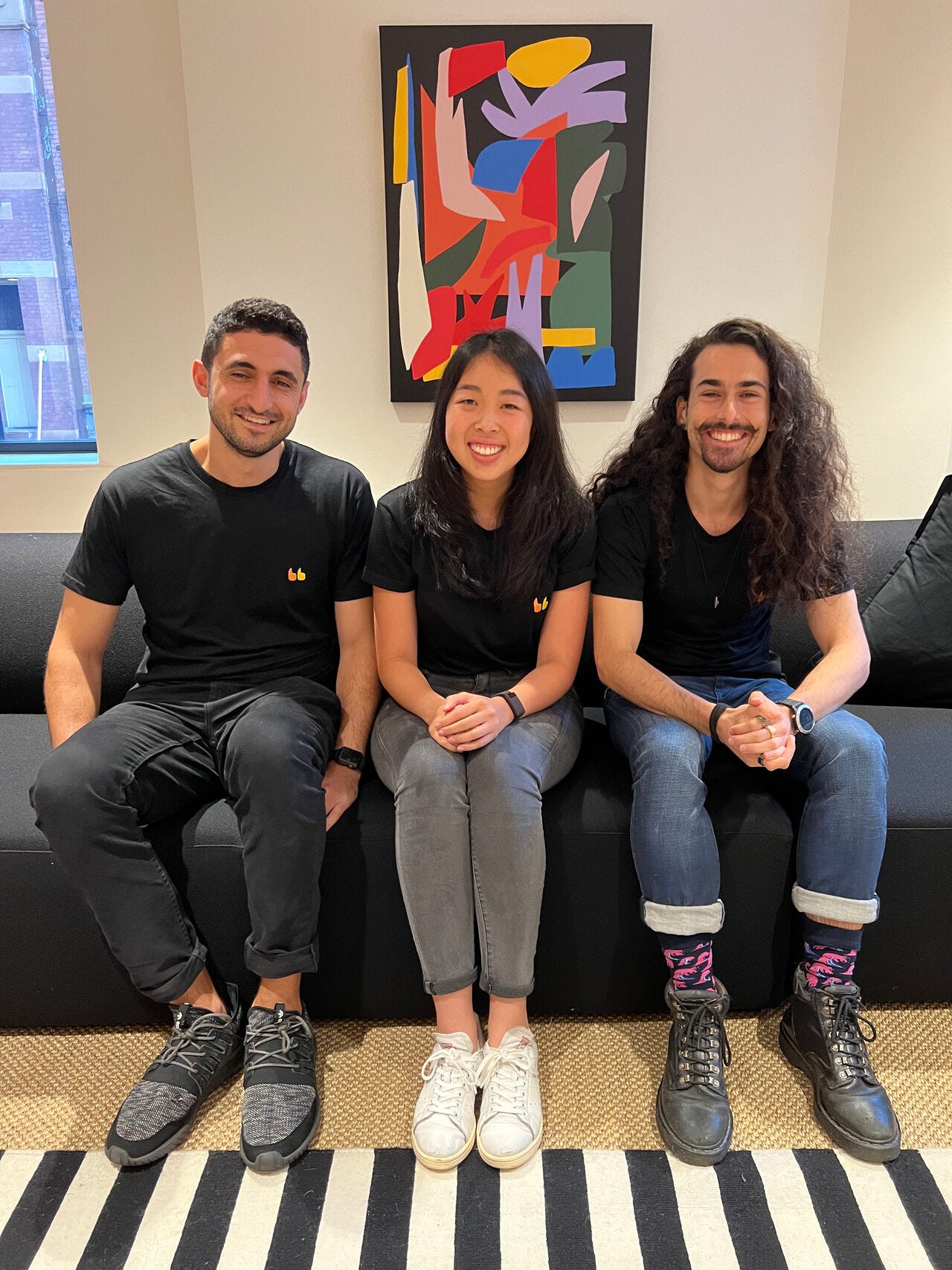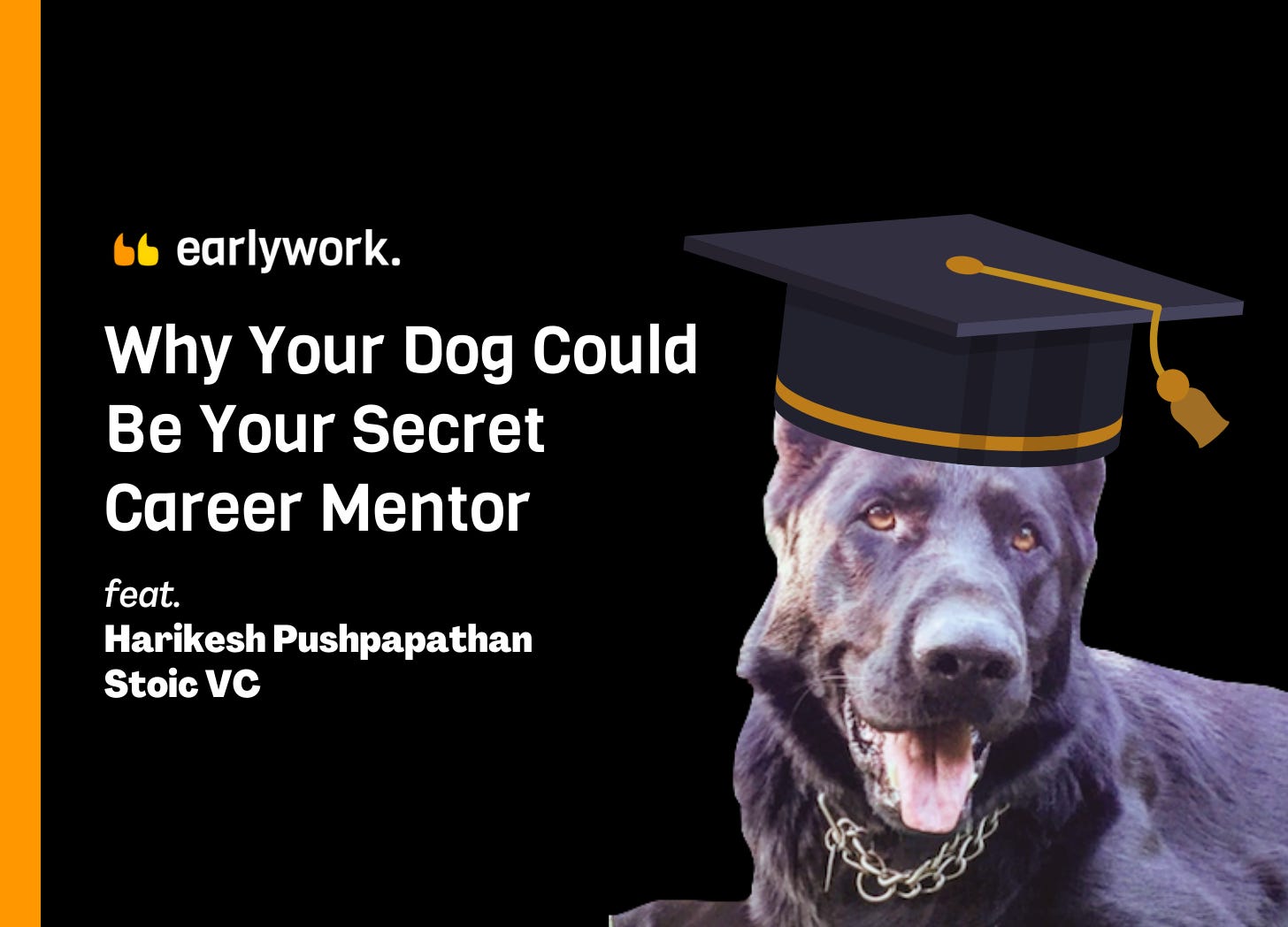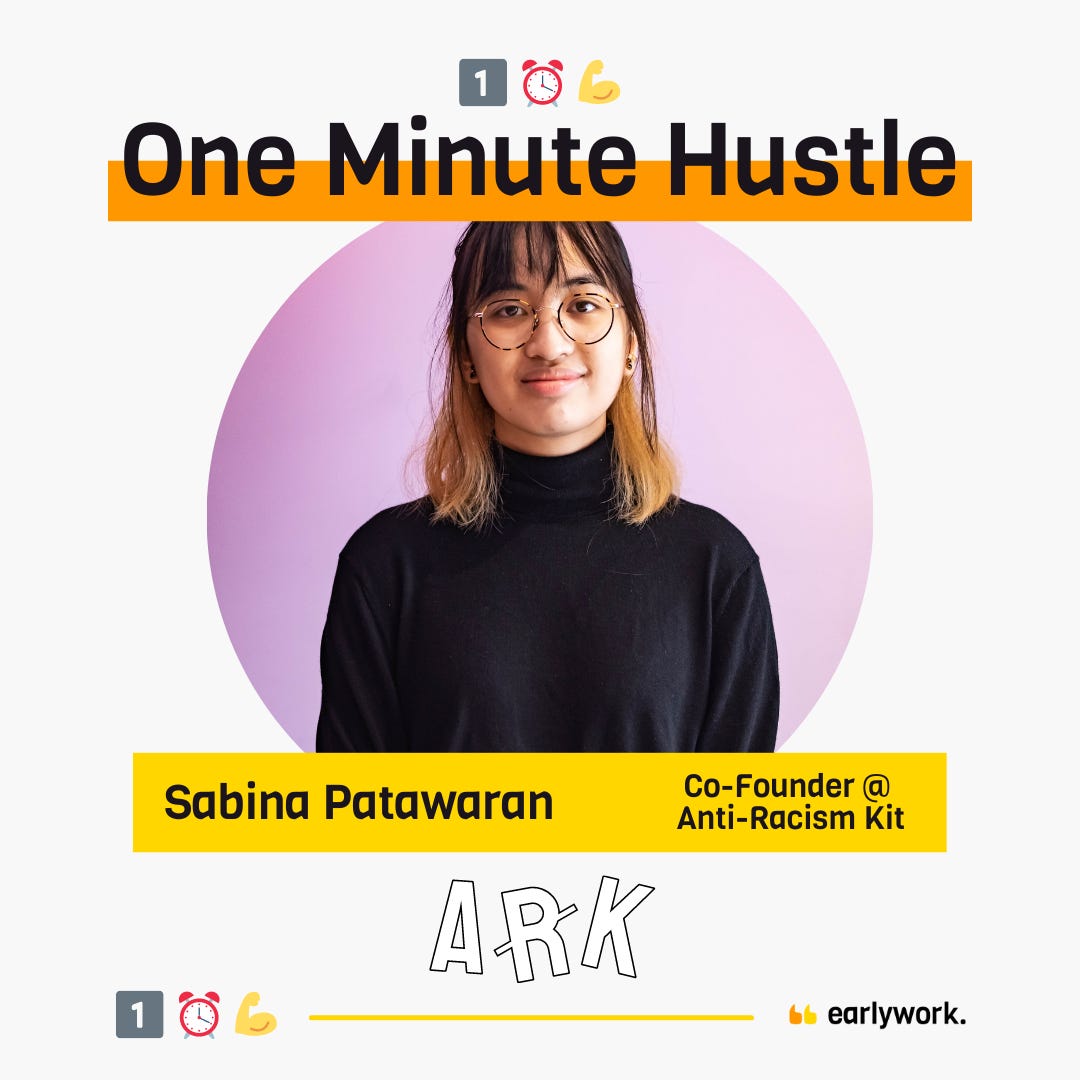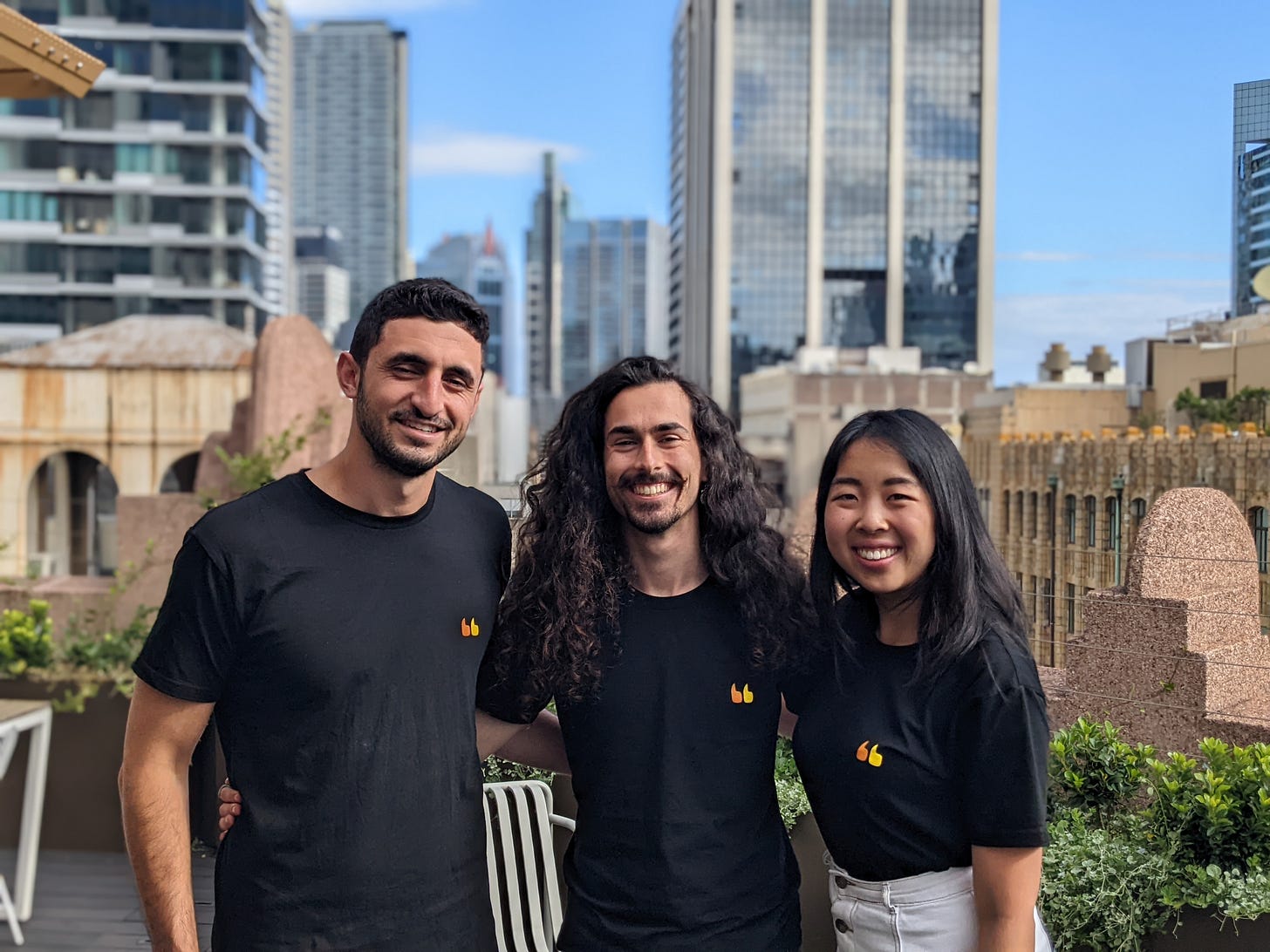🌞 Earlywork #63: Why Your Dog Could Be Your Secret Career Mentor
How Harikesh Pushpapathan (Stoic VC) levelled up his thinking by learning from his German Shepherd
Ello ello Earlyworkers!
Coming at you bright-eyed and bushy-tailed is Earlywork #63, a weekly cheeky newsletter sent every Tuesday that provides free resources + interviews on the careers of tomorrow, for 4K+ young Aussies & Kiwis in the tech, startup & social impact landscape.
If you’re not already part of the Earlyverse 🌞🌐, subscribe now to keep a pulse on our latest stories and conversations:
🚨 Earlywork is HIRING 🚨
Wanna be the first hire at a venture-backed startup on a mission to build the world's #1 future-focused careers community? 🤩
Here's your chance... 👀
Come join Marina, Jono & I as a Community & Marketing Associate in this awkward Earlywork family photo…
You'll be playing a mission-critical role in creating the careers of tomorrow for thousands of young Aussies & Kiwis
🙋 Q&A THREAD HERE 🙋
💡Weekly Cheeky Tip
Where did you learn the formative mental models of your career?
The most common answers I hear among folks in the startup world are: learning by doing, lessons from great articles & books, advice from mentors, and career conversations with friends.
One answer I had not heard until a few weeks ago: pets.
So when Harikesh Pushpapathan (Deep Tech @ Stoic VC), approached me about an idea for a newsletter on the lessons he learned from his dog, and how they relate to his work, I was a little shook.
After seeing his insights, it made me zoom out on the scope of experiences that shaped how I learn, think & work, from starting a subreddit in high school, to writing songs in a rock band, to managing a social soccer club.
At the core of creativity, we’re ultimately forming links between seemingly disparate pieces of information in the brain.
Take the words of philosopher Albert Camus, the second-youngest winner of the Nobel Prize in Literature and leading thinker in the rise of absurdist philosophy:
“All that I know most surely about morality and obligations, I owe to football.”
It may same paradoxical, but our most useful principles in a given domain often occur well outside that domain.
So when it comes to career learning, the most valuable lessons often lie well beyond the workplace.
Harikesh’s story below is a fantastic & entertaining example…
“Learning follows you wherever you go”
Literally.
Aside from the many regrets I‘ve amassed across my twenty-odd years, nothing has proved more difficult to shake off than my 50kg German Shepherd, Koda.
In the rare moments where he’s not ambling behind me or running laps around my toes, Koda’s either eating, sleeping, or distracted by a “new thing”.
Little makes his pupils dilate more than a fresh five dollar, multi-coloured ball from Petbarn.
The irony is, Koda has been exponential to my growth over the past four years, and it seems that as long as he never stops following, my learning won’t either.
Here are the four most important lessons I’ve learnt from Koda thus far and how it’s radically elevated my thinking.
1. Be more inquisitive than the day before. 🧠
You’ve probably seen this tagline regurgitated a thousand times on your LinkedIn feed, but curiosity is needed for both productive and efficient learning.
So how do you break down curiosity? Here’s the formula I use:
Curiosity = Desire for Knowledge + Reducing uncertainty
Desire for Knowledge 📚
Everyone possesses an innate desire for knowledge, but it’s the extent of that desire which seems to dictate how much we grow over time.
Every time I call his name, Koda emerges out of a different spot. He’s always in discovery mode, always panting.
At the heart of this is reward circuits: pathways in the brain responsible for mediating incentive learning. Let’s break down what the f*ck this means:
When you ingest new information, information recognised as “rewarding”, the pleasure hormone in your body dopamine is released within the brain.
This in turn tells us that repeating the same behaviour will unlock pleasure , so we do it again and again.
However, the desire will stagnate if what you ingest doesn’t align with what you find rewarding. So find your sweet spot, and the desire will propagate.
Desire for Reducing Uncertainty 📉
The only way to overcome uncertainty is to both anticipate and seek it.
Dogs are wired this way by evolutionary adaptation, primarily in their sense of smell. On average, they possess up to 350 million olfactory receptors in their noses, which is almost six times that of a human’s, and the area of a dog’s brain devoted to olfaction (smell) is forty times greater than ours.
The point is, Koda has been wired to reduce uncertainty every day, simply because his nose says so.
Any foreign acute smell justifies an opportunity to learn, and an opportunity he won’t think twice about.
As humans, tackling uncertainty is perhaps a bit scarier, but building a muscle to be comfortable navigating ambiguity is a valuable asset.
2. You can’t outsource empathy. Work on it. ❤️🩹
To deeply understand others is a difficult task, but I wouldn’t say the same for dogs, especially Koda.
Over the past couple of months, I’ve been in and out of hospital and it’s meant a lot of disgruntled hours and constant self-deprecation. I do my best to put up a facade, but to him I’m nothing but glass.
Even if I stumble or wince a fraction, I’ll hear his paws scuttle from the other end of the house to my feet in a matter of seconds.
His ceiling for empathy has become so high that over the past four years, I barely need to use words with him.
Watching the way Koda looks out for the mood of others has been material to my professional growth so far, and in particular, my current role as a venture investor.
I believe the ability to empathise with founders is what defines a top-quartile investor. It’s why you often see ex-founders flourish as VCs.
They’ve gone through the turbulence of building a business from scratch and it’s equipped them with a genuine respect for the craft.
A couple years ago, I worked on a healthtech startup myself. I‘d spend hours upon hours cold-calling government stakeholders, building and re-building the sales strategy, auditing financials, pitching to investors, handling constant rejection, all whilst having to commit to full-time university.
I distinctly remember coming home at midnight one night two years ago, so deeply stressed that I couldn’t sleep for two days. In the next few weeks, the business ran out of runway and after a year of operations, it was time to move on.
Anytime I meet a healthtech founder these days, I paint that exact picture in my mind as objectively as possible.
Behind the facade of a polished pitch deck, there are a lot of rough patches.
3) Listening isn’t hearing. 🙉
“We have two ears and one mouth so that we can listen twice as much as we speak” — Epictetus
Beyond their stupidly good smell, a dog’s hearing is its second-best asset. They can hear sounds of up to 50,000 vibrations a second — more than double the vibrations we can.
In other words, they can comfortably hear frequencies that may appear dead silent to us.
In addition, their ears are far more flexible, recruiting more than 15 muscles for the job. We only have 5, and whilst I can certainly move my ears (weird flex… but okay), 80% of the human population can’t.
But Koda doesn’t just have excellent hearing. He’s excellent at active listening.
Here’s how I break it down:
Attention = Eye contact, Posture
Comprehension & Response = Executes appropriate action, doesn’t jump conversation ( i.e their entire “life story”)
Reflection = Retention
When I talk to my friends, colleagues, founders or family, I try to reflect on whether:
a) They are actively listening
b) I am actively listening
Interactions that don’t fall in either a) or b) tend to be far less rewarding, and I try to remove myself from them.
We all have that friend who claims they have a bad memory. The reality is that they didn’t care enough to listen in the first place.
Active listening is something I put into practice from a very young age and it wasn’t by choice. I’ve always had a stutter, but it was at its worst in my early days of childhood.
My family used to coin me “the thinker”, because as a toddler I’d simply observe, listen and learn, mouthing little to nothing. I found enjoyment in understanding others rather than expressing myself.
Admittedly, these days, I certainly talk more than I should, and I definitely don’t listen as much either.
The unfortunate thing is that no matter the circumstance, most of us are culprits of passive listening, especially if you live in a major city, where there’s a culture of thinking about what’s next and what other people are doing.
We’re so preoccupied with everything but the present, at the expense of rich and meaningful engagement.
I’m certainly not claiming to be perfect, but when I stop to listen to someone, I try to give them the respect they deserve. For me, speech was not a gift, but a skill I had to practice, so I’m especially mindful towards the speech of others.
Next time you engage in dialogue, have this at the back of your mind.
Whether you have satellite-dish ears or regular human ones, there’s no excuse for being a bad listener. Just learn to be present.
4. Learn to thrive alone. 🐺
How comfortable are you eating alone at a restaurant?
For all the socialites, and Myers-Briggs personalities out there beginning with an ‘E’, being around people feels like a pressing need.
For many, it can become a routine distraction from the many duties & concerns of everyday living to the point where it’s unhealthy.
Over time, we may become increasingly reliant on other people (directly and through the internet) to fuel our satisfaction. The risk here is a lot of the people in our lives will be transitory, and only a handful like our family will be alongside us for the long run.
Whilst I’ve sung his praises so far, Koda’s kryptonite is that he cannot thrive by himself.
German Shepherds will choose one person in the family that reciprocates their affection the most.
Unfortunately in our family, that’s the person who also spoils him to death: my father. If he’s not throwing a tantrum in the lounge, eating food, harassing me with a half-torn tennis ball or chasing a bird, he’ll be camped right at the door waiting for dad to come home from work.
He’ll doze off for a couple of hours until mum or I haul him out for a reluctant walk, but the minute the doorbell rings, Koda’s cortisol levels fly through the roof. He’s no longer droopy and could run fifty laps around our suburb.
Koda’s over-reliance on others is a portrait of the way many of us instinctively fill our time with social media and social gatherings, leaving no room for quiet solo contemplation and the chance to cultivate a positive energy independently.
If you want to take steps towards stronger internal vitality, try this: next time when you’re out, dine by yourself at a restaurant. It’s a ritual that’s helped me to find peace in my own energy without rushing toward others to fill the gap.
Summing up
As somebody who’s consumed by full-time work and university, the hours spent with Koda are nothing like they once were.
I’m sure my fellow pet owners reading this have battled with the same truth.
Even if these moments now come in passing, I wrote this piece to acknowledge his immense contribution to my personal & professional growth so far.
A dog is a mirror image of its owner. The more you teach them, the more you learn.
🌏 Earlywork Community
🐝 The Buzz
What’s been happening in the community?
Earlywork Goes All In: Sydney Meetup
Thursday 31st March 5:30pm GMT+11
Come chill with the Earlywork crew this Thursday evening 17:30 at WeWork (66 King St, Sydney CBD). Limited space so RSVP!#health Meetup: Fireside Chat with Amira Skeggs & Emily Unity
Thursday 7th April 7pm GMT +11
Earlyworker Amira Skeggs is hosting an intimate panel on youth mental health with Emily Unity, Host of Multicultural Minds & Winner of the Mental Health Youth of the Year 2021 from Mental Health Foundation Australia#investing Meetup with Michael Frazis
Monday 11th April 8pm GMT +11
Join our chat with the founder of Frazis Capital Partners. We'll be chatting about Michael's investing journey, thesis, views on the market and advice for young investors (NFA of course!).VC 3.0: The Role of Venture Capital in Crypto
Tuesday 12th April 6pm GMT +11
Join Lauren Capelin from Startmate, Abhi Maran from Folklore, and Dan Farahani from Metacollab DAO on a discussion about the opportunities and problems with venture capital involvement in Web3.Earlywork Goes All In: Melbourne Meetup
Thursday 14th April 5:30pm GMT+11
Fear not! We’re also hosting a social catchup for Earlymelburnians at the Square Peg office (19-21 Yorkshire St, Richmond) next Thursday evening on 14 April.
📚 Trending Topics
Our favourite reads and resources being discussed in the Earlywork community.
Stint Community Launches for International Students: Earlyworker Nathan Lee launches a not-for-profit careers community for international students with Enactus.
Frydenberg announces employee share scheme reform for tech companies
UniSuper makes first venture capital foray with $75m funding
Expense management fintech Cape raises $33.1M pre-seed from Aura Ventures & Investible
🐝💼 Buzzworthy Gigs
🟩 Investor - Global Tech Fund @ Square Peg - Sydney / Melbourne
Square Peg is a global investment firm on a mission to empower exceptional founders. With teams in Sydney, Melbourne, Tel Aviv, and Singapore, Square Peg invests in emerging tech companies across the internet economy like Canva, Airwallex & Deputy.
They’re looking for an investor to join the Global Tech Fund team for founder-led tech businesses in listed markets, diving deep into themes and companies, and contributing to investment decision-making.
🌐 Product Design Lead (UI/UX) @ GMI Studios - Sydney / Remote
GMI Studios is a multi-disciplinary product design/development studio & incubation lab across both Web2 and Web3 projects.
They’re seeking a Lead Product Designer to join their founding team. This is a unique opportunity to work with a variety of industry-leading projects in both tech & crypto, and potentially become a Founder or Design Lead of your own independent project under GMI Labs.
📞 Account Executive @ Weploy - Melbourne
Weploy is a Melbourne-based startup focused on CX hiring & management, including a platform that connects businesses with CX talent, and an application enabling the service industry to easily coordinate their remote team.
They’re looking for an Account Executive to bring on new customers, and manage customer accounts to ensure they have a phenomenal experience using Weploy.
🌱 Project Admin Officer @ Corporate Carbon - Sydney
Corporate Carbon is a developer, owner and advisor of projects for carbon market participation, emissions reductions, carbon sequestration and co-benefits for the environment, individuals and businesses.
They’re hiring a Project Admin Officer to support the day-to-day carbon project operations of the Company’s portfolio of carbon projects, including monitoring delivery against project plans, reporting progress, document preparation, regulatory administration and compliance, and engaging with key stakeholders.
If you’re keen to browse our full directory of high-impact entry level roles, check out our Gigs by Earlywork jobs board:
If you’re hiring for early-career roles in tech, startups & social impact, you can share your role on our Gigs Board for free today:
Disclaimer: Earlywork received monetary compensation for the roles featured in this section. If you’re keen to have your roles featured in our newsletter & social media, check out our premium listing options here.
1️⃣ 🕐 💪 One Minute Hustle
We are back once again with One Minute Hustle, a bite-sized interview with an emerging Australian young startup founder or operator.
This week, let’s get inside the noggin of a young founder helping students combat racism in high schools…
Sabina Patawaran, Co-Founder @ Anti-Racism Kit
⚙️ What are you working on?
The Anti-Racism Kit (ARK) is a toolkit made by Australian high school students of colour for high school students that can be used to take down racism brick by brick.
We want to make anti-racism feel more accessible and actionable!
🌱 How’d you get started?
My co-founder, Jin Kim, and I started working on ARK midway through Year 12! This was during 2020 when the lockdowns first started in Australia.
We realised that we had a lot of extra time on our hands, and we could use it towards creating something.
🤔 Why do you do what you do?
I work on ARK because young people of colour deserve better, and they should all have access to safer spaces where they can feel like they're thriving, and not just surviving.
For me, ARK is also a way to help young people out there who want to create change but aren't exactly sure on how to go about it.
Visit the Kit and share the resource to any young people who you think may find value in it!
Keen to share your story, or know a young startup founder or operator we should feature next?
Share your deets below or send to your mate, and we’ll get in touch!
Vibed with this piece?
🍵 Shout us a cheeky herbal tea or chuck us a tip at earlywork.eth
Keen to learn more about what we do? Join the Earlyjourney and hit us up on:
🧡 Earlywork Community
🤝 LinkedIn
🐦 Twitter
📸 Instagram
🎶 TikTok
💌 Email
Ciao for now,
Team Earlywork (Dan, Jono & Marina)
If you’ve got a mate who would find this helpful, spread the love and share it:







